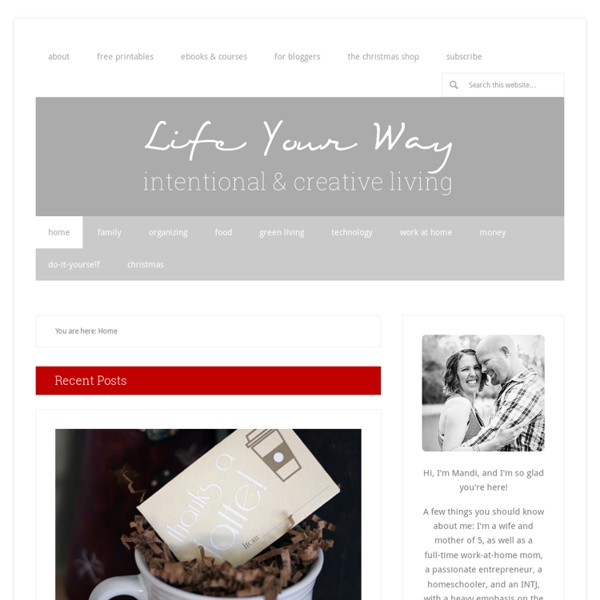



The Procrastination Matrix Note: To best understand this post, you should first read Part 1 of Wait But Why’s previous post on procrastination. PDF: We made a fancy PDF of this post for printing and offline viewing. Buy it here. (Or see a preview.) Back in high school, if you had asked me if I was a procrastinator, I would have said yes. Tool: Free Printable Too Many To Do’s Form Too much on your plate? Keep yourself honest with this to-do list with a twist. It will gently point out when your work, home and everything else lists start to look impossibly long and prompt you to delegate and/or strike non-essential tasks. The Truth About Religion in America: The Founders Loathed Superstition and We Were Never a Christian Nation Once they begin to circulate, falsehoods—like counterfeit currency—are surprisingly tenacious. It doesn’t matter that there’s no backing for them. The only thing that counts is that people believe they have backing.
Sunday Planning – design finch I recently read a statistic that said every minute invested in planning will save you ten minutes down the road. I can personally attest that not only does a little planning ahead help with time management, but it also saves money and reduces stress. Don’t we all want more help in those areas? How to Name a Baby The first time a friend of mine had a child, it was intensely jarring. I’d be living my normal day, and then the thought would hit me—”Matt has a son”—and my whole world would get turned upside down. Three years and six friend babies later, I’m 32 and have numbed to the whole thing considerably. It’s still weird.
March Challenge: Project "Household Binder" {Link Party!} All free printables mentioned within the post are now expired and available for sale! Please check out my Etsy Shop for a large selection of personalized printables to fit all of your household organizing needs! Thank you! It's been thirty-one days of Household Binder heaven! We created, we shared, we drained our printer cartridges, we were binder-makin' fools! How to debug your brain 47.9k shares Share on Facebook Share on Twitter Our brains are the most bug ridden pieces of junk since Internet Explorer. To replicate one common bug, try telling your brain to “go to the gym”. Most brains will respond by updating their Facebook status, and watching cat videos.
2011 Planner… : Crystal Wilkerson I am no longer offering the download to my planner as of Nov 14th. I am currently working on an updated version for 2012 and will post all the details on my blog sometime in December. If you would like to be sure to get the announcement, you can sign up to receive my newsletters on the top, right side of my blog. How To Stop Being Lazy And Get More Done - 5 Expert Tips Some days the to-do list seems bottomless. Just looking at it is exhausting. We all want to know how to stop being lazy and get more done. The Shortness of Life: Seneca on Busyness and the Art of Living Wide Rather Than Living Long “How we spend our days,” Annie Dillard memorably wrote in her soul-stretching meditation on the life of presence, “is, of course, how we spend our lives.” And yet most of us spend our days in what Kierkegaard believed to be our greatest source of unhappiness — a refusal to recognize that “busy is a decision” and that presence is infinitely more rewarding than productivity. I frequently worry that being productive is the surest way to lull ourselves into a trance of passivity and busyness the greatest distraction from living, as we coast through our lives day after day, showing up for our obligations but being absent from our selves, mistaking the doing for the being. Despite a steadily swelling human life expectancy, these concerns seem more urgent than ever — and yet they are hardly unique to our age. In fact, they go as far back as the record of human experience and endeavor.
What I Learned From Dating Women Who Have Been Raped What I Learned From Dating Women Who Have Been Raped I don’t know how I expected a rape victim to act, but I didn’t expect her to be so funny. Or to be punk, in this kinda sexy bleached blonde but kind of too lazy to really care sort of way. Or to be so up front. “I may be a lesbian because of what happened to me, I don’t know.